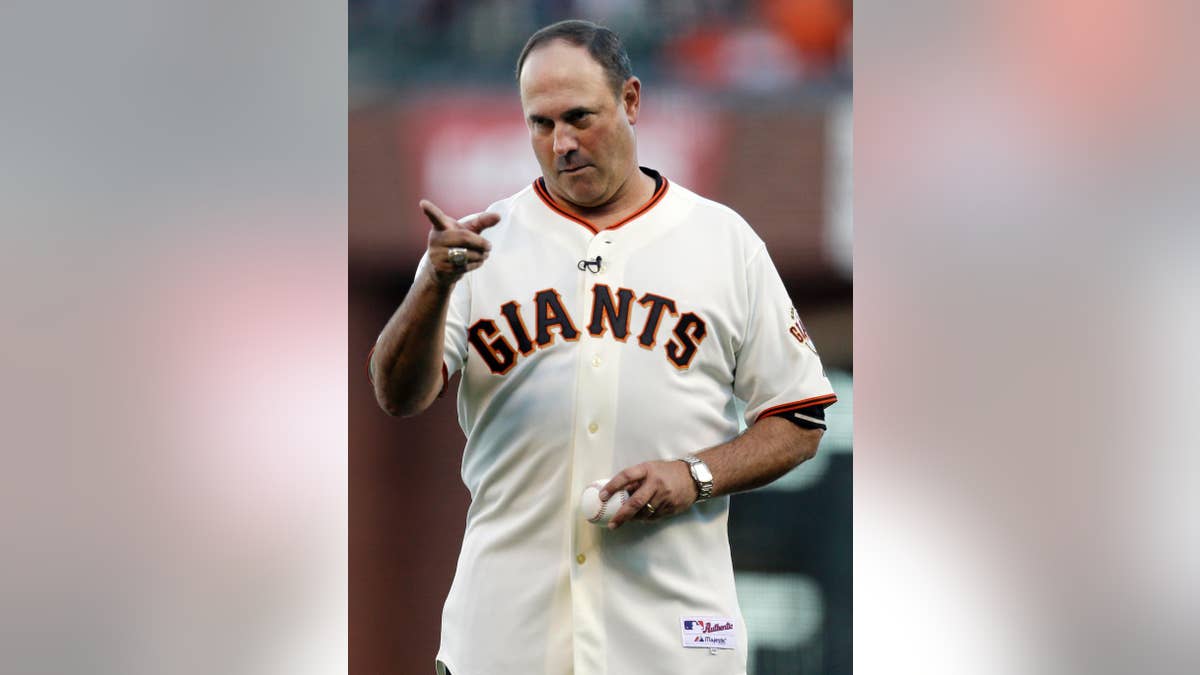
FILE - In this Oct. 14, 2012, file photo, former San Francisco Giant Will Clark prepares to throw out the first pitch before Game 1 of baseball's National League championship series between the San Francisco Giants and the St. Louis Cardinals in San Francisco. Will Clark remembers each moment of the day a major earthquake interrupted the 1989 World Series and Candlestick Park swayed ahead of Game 3 of the Bay Bridge Series against the Oakland Athletics. (AP Photo/Ben Margot, File) (The Associated Press)
SAN FRANCISCO – Will Clark remembers each moment of that day when a major earthquake interrupted the 1989 World Series, from the sprint out to center field he had just completed during warmups to the fear and chaos that followed in the ballpark and well beyond.
The former Giants star first baseman, now part of another World Series as a coach with his old club, can hardly comprehend that 25 years have passed since Candlestick Park swayed just before Game 3 of the Bay Bridge Series against the Oakland Athletics.
As Clark ran through the outfield on Oct. 17, 1989, he could actually see the 6.9-magnitude temblor coming. Light standards began moving back and forth and a wave traveled through the stands and around the stadium's boomerang-shaped concrete shell.
He still thinks about it regularly, and also the sting of being swept once the Series resumed 10 days later.
"Very fresh," Clark said Sunday, standing in a corner of the dugout in AT&T Park as the Giants emerged for Game 5 batting practice. "There are a lot of memories you think about and you're like, 'Oh my goodness, that was pretty traumatic.' After having been through it and being out on the field and being in the community for those next 10 days, it's something that's going to stick with me forever."
Sold-out, 62,038-seat Candlestick was in better shape than much of the surrounding area, and was safely evacuated. As word of damage and devastation from the Loma Prieta quake began flooding into The Stick, Clark and his teammates knew immediately they wouldn't be playing for a while. Clark's first priority then became getting his family out of the stands.
"When you were going through it, I think that you know exactly when and where you were and what went on around you," Clark said. "The days after that, believe it or not, sort of come into a blur, but during the event I knew everything that was going on."
To this day, Clark hurts about the eventual loss of Isiah Nelson III, the San Francisco Police officer responsible for running the show and getting everybody out of Candlestick that day. Nelson wasn't killed that day, but the following April at age 36 when his motorcycle struck a concrete barrier on Interstate 280 as he returned from security detail at Candlestick.
"That is still sort of emotional to me," Clark said. "He basically took care of that whole situation there at Candlestick. He ran the whole thing. ... To this day that's really emotional for me. He and I were good friends and he was around the ballpark all the time."
After the best-of-seven Series ended in four games, Clark hosted a barbecue the following day for those still in town, then he went to work in the community to offer both an extra set of hands for cleanup efforts and much-needed moral support.
The 50-year-old Clark has since lived through Hurricane Katrina in his native Louisiana. Earlier this month, he did an appearance at Candlestick, and it was surreal to see the old seats being removed in the now out-of-commission venue.
All the memories came rushing back.
"Any disasters like this, everybody's affected in some way," Clark said. "You know somebody, or a friend's friend. It kind of sits with you, and you take it with you wherever you go."
